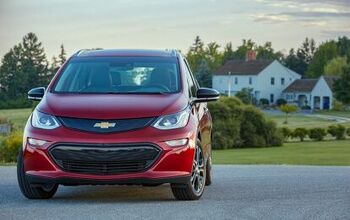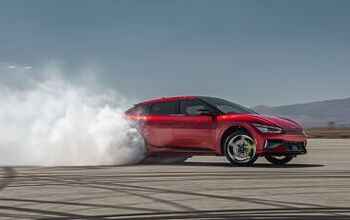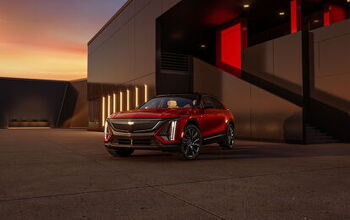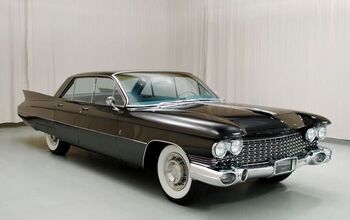GM Replacing Battery Modules On Recalled Chevy Bolts

The Chevrolet Bolt has become the focus of negative attention following some fire incidents that were believed to be related to battery components. After two recalls, General Motors has decided to replace the battery modules of every model that could be impacted — rather than focusing on units with proven defects.
While it’s undoubtedly going to cost the company a fortune, this is probably the correct move. The implications of negative publicity stemming from repeat vehicle fires have a tendency to linger and be blown up to larger-than-life proportions. This is especially true if an automaker rushed that vehicle to market to better wrangle the segment. Just ask Ford about the Pinto if you’ve any doubts.
GM’s previous solution involved simply updating the software of all 2017-2019 model year Bolt EVs. However, one of those vehicles also caught fire and forced the automaker to double down on its recommendations to have Chevy customers park their cars outdoors a healthy distance from anything they might not want to see barbequed. Charging protocols were also issued, with owners being warned not to fully deplete the battery.
It also threw its supplier under the bus, citing South Korean manufacturer LG Chem’s Ochang facility in South Korea as having issued bunk hardware. Though LG has received additional criticism from other automakers who’ve used its batteries only to find themselves issuing fire-related recalls of their own (e.g. Hyundai).
The supplier has said it’s onboard to help General Motors to ensure recall efforts are carried swiftly and that the duo had jointly identified two manufacturing defects (claimed to be rare) that caused the fires. Those modules will no be replaced, without the need for the automaker to conduct an investigation of every vehicle. Customers can bring their vehicles to any GM service center for repairs, though it will need to be EV-certified to handle this particular recall.
In the meantime, it’s still recommending owners park their Bolts outdoors and charge them after each use to avoid having to keep them plugged in for longer than absolutely necessary. Ideally, the manufacturer doesn’t even want you to leave them unattended while charging. The software update is also supposed to be helpful, though it doesn’t seem to have been an effective remedy overall.
[Image: General Motors]

A staunch consumer advocate tracking industry trends and regulation. Before joining TTAC, Matt spent a decade working for marketing and research firms based in NYC. Clients included several of the world’s largest automakers, global tire brands, and aftermarket part suppliers. Dissatisfied with the corporate world and resentful of having to wear suits everyday, he pivoted to writing about cars. Since then, that man has become an ardent supporter of the right-to-repair movement, been interviewed on the auto industry by national radio broadcasts, driven more rental cars than anyone ever should, participated in amateur rallying events, and received the requisite minimum training as sanctioned by the SCCA. Handy with a wrench, Matt grew up surrounded by Detroit auto workers and managed to get a pizza delivery job before he was legally eligible. He later found himself driving box trucks through Manhattan, guaranteeing future sympathy for actual truckers. He continues to conduct research pertaining to the automotive sector as an independent contractor and has since moved back to his native Michigan, closer to where the cars are born. A contrarian, Matt claims to prefer understeer — stating that front and all-wheel drive vehicles cater best to his driving style.
More by Matt Posky
Latest Car Reviews
Read moreLatest Product Reviews
Read moreRecent Comments
- ToolGuy My latest vehicle acquisition is slightly older than this one, same parent company, but has a full frame, rear-wheel drive and a longitudinally-mounted pushrod V8 gasoline engine. Almost like it was engineered and manufactured by a completely different group of people. Hmmm...
- EBFlex Smart people
- Wjtinfwb "Rovelo" tires? Good to see TTAC is not above the shameless commercial endorsement of unknown product like it's bigger print competitors.
- Wjtinfwb Looks in decent nick for a Junkyard car. Other than the interior being partially gutted for some trim pieces, you could probably drive it out of the junkyard. Maybe a transmission issue and the cars value precluded a $2k or more fix? J cars were pathetic when introduced in '82 and never really got any better. But GM did sort out most of the reliability issues and with a modicum of maintenance these would run a long time if you could stand the boredom. Guess this owner couldn't.
- GS340Pete I see a lot of these on the road. I can't remember the last time I saw one on my local Chevy dealership's lot. They've never in my memory had a few lined up with balloons. Short sighted to kill it off? Perhaps. But I certainly think the rows of $65k and up trucks is short sighted. That's going to bite soon. Looks like they're piling up already.And what about the Trax? Malibu or Trax? Gotta be honest, I'd pick the Trax.Although it should have 50 more HP IMHO. And why are so many preaching doom about the 'wet belt' engine?RIP, Malibu. Ride the highway in the sky with the Impala (talk about short sighted.)


































Comments
Join the conversation
Fortunately, GM does not sell a lot of these. As this happens Tesla pulls further ahead. With the exception of the Corvette and a few Cadillac sedans does GM produce anything that is desirable.
Subjective of course, but GM seems to be the poster child for recalls these days.